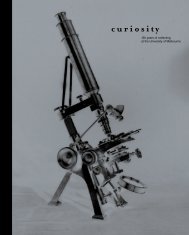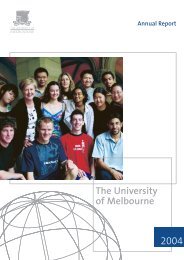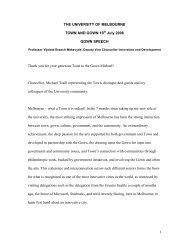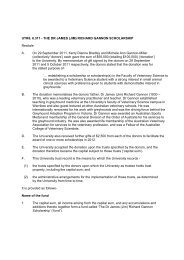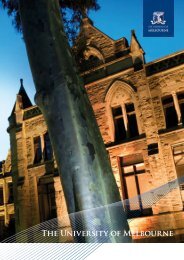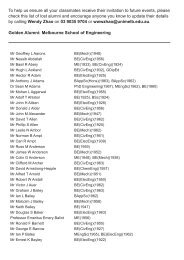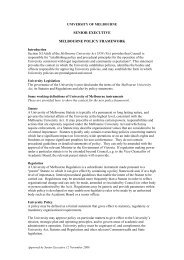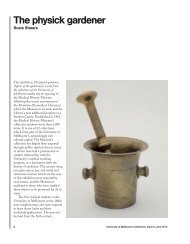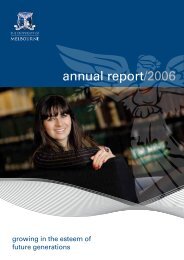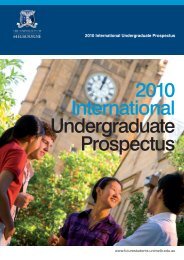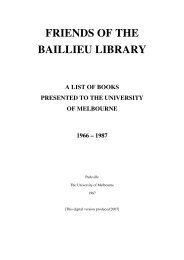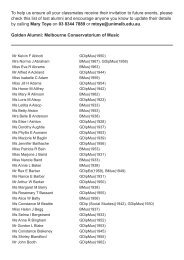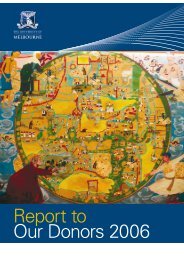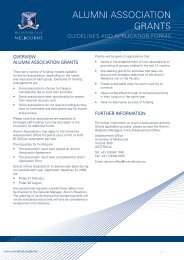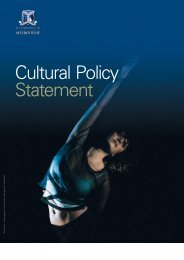2007 Annual report (PDF 8.1 Mb) - University of Melbourne
2007 Annual report (PDF 8.1 Mb) - University of Melbourne
2007 Annual report (PDF 8.1 Mb) - University of Melbourne
Create successful ePaper yourself
Turn your PDF publications into a flip-book with our unique Google optimized e-Paper software.
KNOWLEDGE<br />
TRANSFER<br />
Internationally acclaimed author and influential public speaker in the realms <strong>of</strong> art and philosophy Associate Pr<strong>of</strong>essor<br />
John Armstrong was appointed inaugural Knowledge Transfer Fellow<br />
Achievements<br />
All six New Generation undergraduate<br />
degrees include Knowledge Transfer in their<br />
core programs. Administrative, resourcing<br />
and compliance issues associated with<br />
the incorporation <strong>of</strong> knowledge transfer<br />
experiences in New Generation degrees<br />
were addressed by the <strong>Melbourne</strong> Model<br />
Implementation Taskforce during the year.<br />
Dr Jo Barraket, an academic with<br />
considerable experience in the area, was<br />
appointed for six months as Knowledge<br />
Transfer Liaison Officer to assist as the<br />
detail <strong>of</strong> the curriculum was developed.<br />
The connections between knowledge<br />
transfer, curriculum and the <strong>Melbourne</strong><br />
Experience are naturally an area requiring<br />
ongoing attention as the New Generation<br />
degrees take shape. The Increasing<br />
Academic Enrichment Committee has been<br />
established to fulfil this role.<br />
Faculties took a major step toward<br />
embedding knowledge transfer in the<br />
<strong>University</strong>’s operations when they<br />
incorporated knowledge transfer plans<br />
into their business plans early in <strong>2007</strong>. The<br />
executive structure <strong>of</strong> the faculties now<br />
includes an Associate Dean (Knowledge<br />
Transfer) or equivalent.<br />
In June, $1 million was allocated for the<br />
establishment <strong>of</strong> a Knowledge Transfer<br />
Office with responsibility for further<br />
development and implementation <strong>of</strong> the<br />
<strong>University</strong>’s knowledge transfer strategy,<br />
policies, programs and communications.<br />
The Knowledge Transfer Office has initiated<br />
a pilot partnerships program, forming<br />
interdisciplinary partnerships with two<br />
major companies to work on a range <strong>of</strong><br />
projects. The Office will use this experience<br />
to prepare training material for skill<br />
development in partnership establishment<br />
and management, along with guidelines to<br />
coordinate it.<br />
Recognition<br />
Strategic Priorities<br />
> Implement initiatives for recognising<br />
and rewarding excellence in knowledge<br />
transfer<br />
> Incorporate knowledge transfer as a<br />
criterion in academic promotions guidelines<br />
Achievements<br />
In <strong>2007</strong>, achievements in knowledge<br />
transfer were recognised through a number<br />
<strong>of</strong> developments.<br />
A program <strong>of</strong> knowledge transfer awards<br />
and grants was inaugurated, with the<br />
intertwined objectives <strong>of</strong> rewarding<br />
excellence, providing seeding for new<br />
knowledge transfer activities and improving<br />
understanding <strong>of</strong> Knowledge Transfer<br />
within the <strong>University</strong>.<br />
These program objectives were achieved<br />
with the following awards:<br />
> four Knowledge Transfer Excellence<br />
Awards <strong>of</strong> $5000, rewarding and<br />
highlighting excellence in knowledge<br />
transfer;<br />
> ten Knowledge Transfer Project Grants<br />
<strong>of</strong> up to $10000, matching in-kind and/or<br />
financial contributions secured with<br />
partners; and<br />
> four Knowledge Transfer Visiting<br />
Scholar Grants <strong>of</strong> up to $10,000 for a<br />
visit by a scholar who is experienced in<br />
knowledge transfer.<br />
Such was the quality <strong>of</strong> the response that<br />
a further seven commendations <strong>of</strong> $1500<br />
for achievements in knowledge transfer<br />
were awarded.<br />
> The inaugural Vice-Chancellor’s<br />
Knowledge Transfer Excellence Awards<br />
and Symposium highlighted the work <strong>of</strong><br />
the award winners and <strong>of</strong> the <strong>University</strong>’s<br />
partners. Highlights <strong>of</strong> the Symposium<br />
included panel sessions with external<br />
partners giving their perspective and<br />
sessions focusing on key aspects <strong>of</strong><br />
knowledge transfer, including: knowledge<br />
transfer in teaching and learning; and<br />
finding partners and financing; and<br />
working with partners and providing<br />
outcomes. The Awards provided an<br />
excellent showcase <strong>of</strong> knowledge<br />
transfer for the public.<br />
New Academic Promotions Guidelines<br />
approved by Council now include<br />
Knowledge Transfer as one <strong>of</strong> four criteria<br />
for promotion, and will be implemented in<br />
the 2008 round <strong>of</strong> academic promotions.<br />
Measurement<br />
Strategic Priorities<br />
> Develop detailed measurement and<br />
evaluation <strong>of</strong> knowledge transfer.<br />
> Assist in the development <strong>of</strong> impact<br />
material for the RQF.<br />
Achievements<br />
In order to make knowledge transfer more<br />
tangible and visible at the <strong>University</strong> it is<br />
essential to develop systems to monitor<br />
knowledge transfer activity, even though<br />
this is recognised internationally as a<br />
complex task. Only by measuring and<br />
evaluating activity, will the <strong>University</strong><br />
be able to assess its performance and<br />
ensure that it not only remains a leader in<br />
the field, but is constantly improving. The<br />
Measurement Working Group prepared a<br />
paper outlining the major conceptual and<br />
pragmatic requirements for developing<br />
such a system as well as the connection<br />
between knowledge transfer and the use<br />
<strong>of</strong> impact as a measure <strong>of</strong> research in the<br />
Research Quality Framework (RQF). The<br />
Group’s recommendations will form the<br />
basis for a specific project on measurement<br />
in 2008 piloting databases and evaluation in<br />
two faculties in 2008.<br />
The <strong>University</strong> <strong>of</strong> <strong>Melbourne</strong> <strong>Annual</strong> Report <strong>2007</strong> 45



